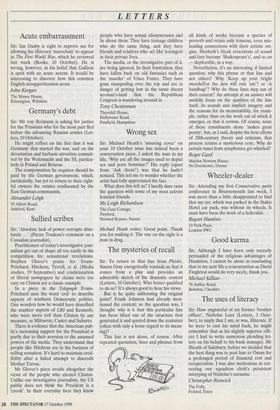The mysteries of recall
Sir: To return to that line from Phedre, Simon Gray energetically reminds us that it comes from a play and provides an admirable sketch of the dramatic context (Letters, 10 October). Who better qualified to do so? It's always good to hear his views.
But is he quite addressing the original point? Frank Johnson had already men- tioned the context; so the question was, I . thought: why is it that this particular line has been lifted out of the structure that generated it and quoted down the centuries (often with only a loose regard to its mean- ing)?
This line is not alone, of course. After repeated quotation, lines and phrases from all kinds of works become a species of proverb and retain only tenuous, even mis- leading connections with their artistic ori- gins. Macbeth's bleak evocations of sound and fury become 'Shakespeare's', and so on — deplorable, in a way.
Nevertheless, it's an interesting if limited question: why this phrase or that line and not others? Why 'Keep up your bright swords/For the dew will rust 'em'? or 'A handbag!'? Why do these lines step out of their context? An attempt at an answer will usefully focus on the qualities of the line itself, its sounds and implicit imagery and the reasons for its memorability, for exam- ple, rather than on the work out of which it emerges, or that it crowns. Of course, none of these constituents alone 'makes great poetry', but, as I said, despite the best efforts of 20th-century theory and criticism, that process retains a mysterious core. Why do certain tunes from symphonies get whistled?
Roger Gard
Maiden Newton House, Nr Dorchester, Dorset










































































 Previous page
Previous page